Classic Car Market Trends 2024
To ensure we are able to assit our clients with classic car inspections and classic vehicle valuations for insurance (including total loss settlement and agreed valued policies) we pool classic car data from numerous sources. This informaiton is also vital when making representations during litigation cases included high value personal collections.
It has been obvious from our own engineers data that classic car vaues have dropped during 2024, one of our data points The Classic Valuer provides this further insight.
All the data presented has been analysed by The Classic Valuer and is based upon verified sold prices from over 40 auction houses around the world.
What happened to prices in 2023 vs 2024?
The collector car market overall saw prices fall 10.2% between 2023 vs 2024, down from £24,750 to £22,223.
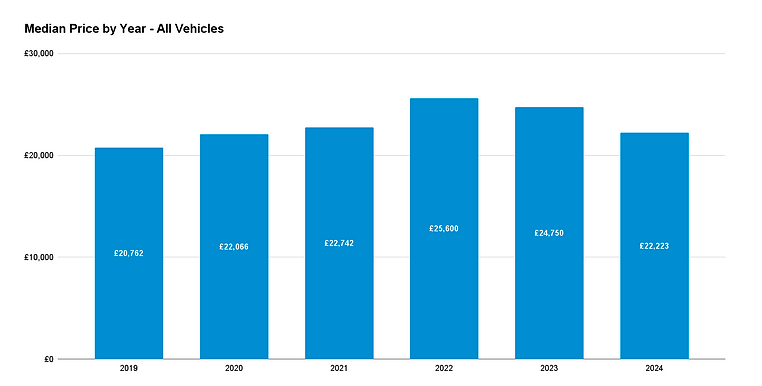
The median is the middle value in a list of prices when they are arranged from lowest to highest, so here the middle car in that list would've be worth £22,223 today, or just over £2,500 less than last year.
(The above chart isn't adjusted for inflation. Global headline inflation in 2024 is projected to be 5.2%, in the UK the annual inflation figure is currently just below 3%.)
What that means is in real terms the collector car market has seen prices fall 14% in 2024.
The market when you focus on classic vehicles, defined as those 40 years or older for the purposes of this, saw very similar results with the market down 10.6% year-on-year.
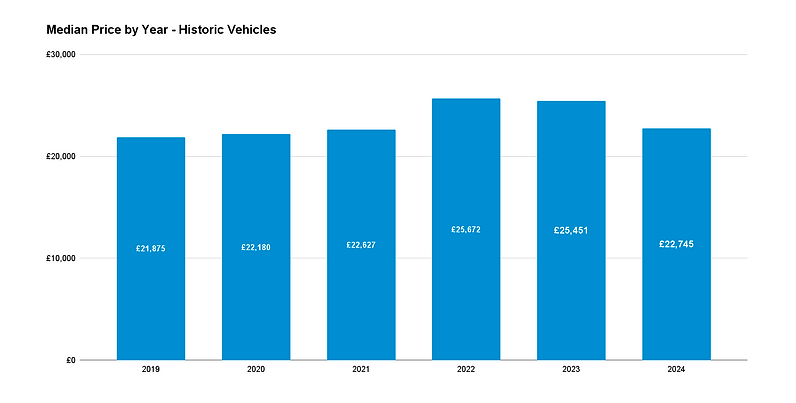
Price changes in the UK, US and the EU present a hugely varied picture.
- Prices in the UK fell 14% between 2023 and 2024.
- Prices in the US fell 14% as well between 2023 and 2024.
- Price in the EU rose 14% between 2023 and 2024.
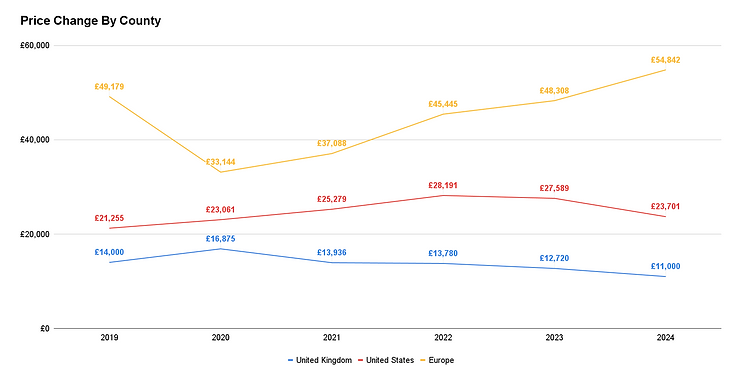
Why? You'll generally hear people blame two main factors for price movements.
1 - Consumer confidence, in the case of 2024 this was primarily held back by significant political instability.
2 - Interest rates, the higher they are, generally the more downward pressure on prices.
Other factors that may impact price movements?
Supply.
At the top level, 2024 has seen more cars come to auction than ever before.
The US has seen 40% (!) more vehicles come to auction in 2024 than in 2023
The UK has seen a 2% fall in the number of vehicles at auction this year.
The EU where has seeon 13% less cars come to auction in 2024 than 2023.
People often see prices rise or fall and think they might be explained away by simply more or less expensive vehicles coming to market rather than the market value of vehicles is changing.
We can test that by looking at the data on a model-by-model basis.
When we analyse the 200 most popular models in our database, 76% of those have fallen in value from 2023 to 2024.
The average price fall is 8%, not dissimilar to the 10% fall we've seen at an overall market level.
This tells us that it's not cheaper cars coming to market but rather the market value of those cars has fallen.
This pattern is repeated when analysing by make. Looking across the top 50 most popular makes, only 4 of them have risen in value in 2024:
- Austin-Healey +1%
- Citroen +3%
- Rolls-Royce +8%
- Lamborghini +22%
So no, its not cheaper cars coming to market, rather the market value of those models is falling.
What types of cars performed well in 2024?
The next graph shows the price change for cars produced in the 1920s through to 2010s since 2019. It displays the changing tastes in the collector car market. (something that our own engineers feedback upon).
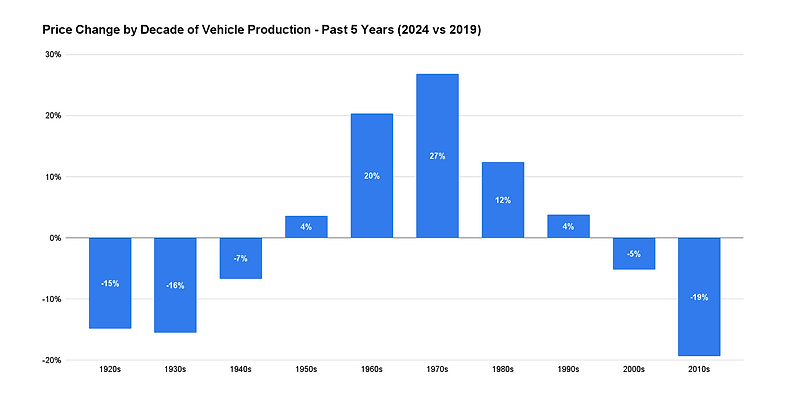
It shows the increasing desire of late for 1970s - 1990s vehicles and the falling demand historically for pre-1950s vehicles.
When you run the same graph but instead of comparing 2019 to 2024, you compare 2023 to 2024 you get the result below.
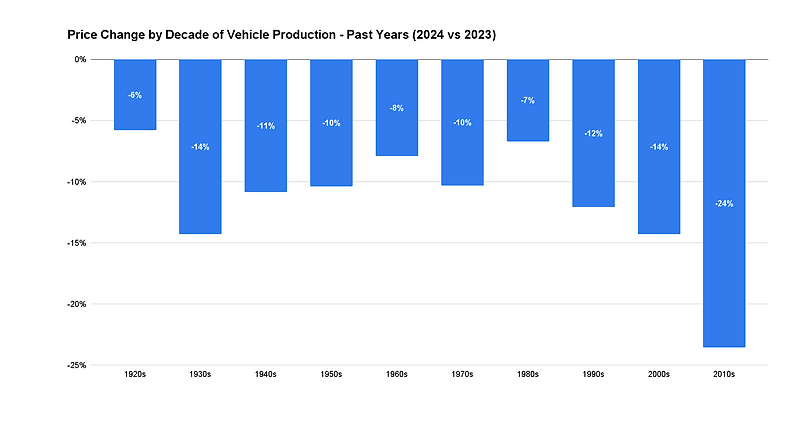
The data shows very single decade is now seeing price falls across the board, the extent of which varies greatly.
The 2010s has seen the largest price fall down 24%. A large chunk of these vehicles are purchased on finance and given the average interest rate remained higher in 2024 than it was in 2023 on average this has made financing these vehicles more expensive and therefore downward pressure on prices.
The 1920s has seen the best performance, perhaps another sign of hope for the old guard. Looking back over the past 5 years shows the median values for 1920s vehicles bouncing consistently between £15,000 - £20,000 - not a continued decline like many thought.
The 1980s has seen the second strongest performance as more collectors who grew up with poster cars from the 80s on their wall enter the market.
Aligned to the above, the below cars from the 1980s performed well.
The later Porsche 930 with the 3.3 Litre saw prices across all variants rise 21% on average comparing 2023 to 2024.
Early Testarossas (1980s) also performed well with prices up 22%.
What about demand for collector cars?
Firstly, if we wind the clock back to the end of H1 2024, at the mid-point of the year prices were down 13% globally vs the same period in 2023. Prices now are down 10% over the whole year, we've gained back some ground. Why? Well the elections for the most part are out of the way and interest rates are falling and are forecast to fall further through 2025.
Secondarily, sell-through rate indicates a stabilisation. The sell-through rate (the number of vehicles that sell at auction as a percentage of the total that come to auction) in 2021 was 78%, it fell to 72% in 2022, it fell again in 2023 to 67% but the great news is it has stabilised and now sits at 68%.
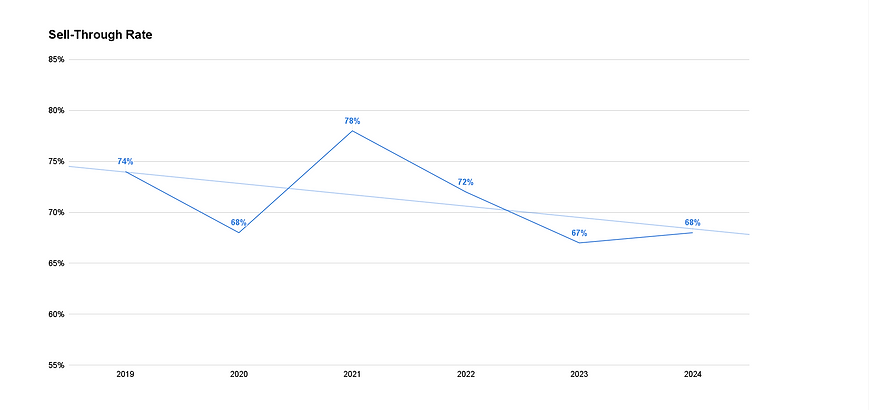
In conclusion
Prices are back down to 2021 levels with the market for both all collector and classic cars falling 10%. That's highly fragmented by market with the UK and US down 14% and the EU up 14%
Whilst this will have a near term effect on current owners but it also opens up cars to new and existing collectors that would've been unobtainable and also new collectors tempted by great value.
2024 appears to be a turbulant year with consumer confidence, political instability and supply driving prices. However interest rates have fallen in 2024 and are expected to continue to do so in 2025, that'll will typically make prices rise further.
Supply is the big unknown and it's what the price movements in 2025 will most likely depend upon.
Category




